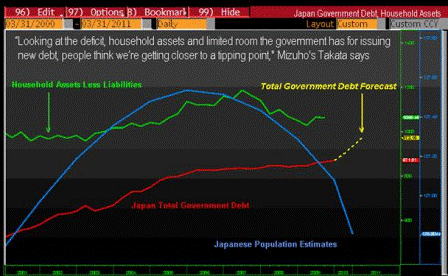The tipping point is the point where the deficit spending finally is sufficient to create enough aggregate demand to restore output and employment.
Probably not quite there yet. And moves towards ‘fiscal responsibility’ further delay the restoration of output and employment.
And note that even the bearish rate forecast, below, is hardly the stuff of a liquidity crisis, nor will it ever be under current institutional arrangements, which are very different from Greece, also mentioned below.

Japan at Tipping Point as Debt Approaches Assets: Chart of Day
By Minh Bui and Aki Ito
Feb. 25 (Bloomberg) — Japan’s total public debt is nearing the value of household wealth, a sign the government bond market is approaching a “tipping point,” according to Mizuho Securities Co.
The CHART OF THE DAY shows net assets of Japanese households and total government debt. Net assets dropped to 1,065 trillion yen ($11.8 trillion) as of September and the Finance Ministry projects public borrowings will reach a record 973.2 trillion yen by March 2011. Japan’s population, which is shrinking, is also tracked.
“There’s a lot of nervousness in the markets that these two numbers are converging,” said Hajime Takata, Tokyo-based chief strategist at Mizuho. “Looking at the deficit, household assets and limited room the government has for issuing new debt, people think we’re getting closer to a tipping point.”
The yield on 10-year bonds could rise to as high as 1.6 percent this year as investors demand higher premiums for the country’s debt, he said. Benchmark bond yields were at 1.32 percent yesterday in Tokyo.
The narrowing gap is especially alarming for Japan, where more than 90 percent of public debt is held by domestic investors. Bank of Japan Governor Masaaki Shirakawa urged the government to shore up finances, particularly as investors scrutinize sovereign accounts more closely because of Greece’s financial woes. Mizuho’s Takata says he doesn’t expect public liabilities to exceed household wealth for at least two years.
Prime Minister Yukio Hatoyama said he will unveil in June a plan to contain debt after Standard and Poor’s lowered the outlook on Japan’s AA sovereign rating last month. Kaoru Yosano, a former finance minister, warned on Jan. 22 the country could face an “uncontrollable rise” in bond yields if debt exceeds household wealth.

